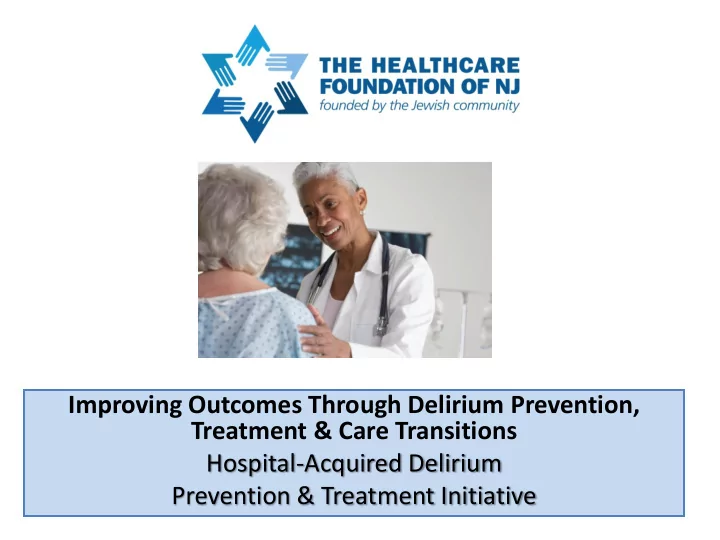

Improving Outcomes Through Delirium Prevention, Treatment & Care Transitions Hospital-Acquired Delirium Prevention & Treatment Initiative
SESSION LEARNING OBJECTIVES HOSPITAL ACQUIRED DELIRIUM (HAD) PREVENTION, TREATMENT & CARE TRANSITIONS - Develop a basic understanding of Hospital-Acquired Delirium - Learn why it is important to be aware of HAD and intervene - Know who is at risk and learn to recognize the signs and symptoms of HAD - Become familiar with best practices in various healthcare settings - Recognize how to strengthen care transitions for patients at risk, suspected of, or returning with HAD, to improve outcomes and reduce costs - Be aware of what family members need to know - Link to resources
Healthcare Foundation Mission and Funding Priorities Hospital Conversion Foundation Serving Greater Newark & the Jewish community of MetroWest Improving the health of vulnerable children & adult s Focus on Elderly Adults www.hfnj.org Visit HFNJ on Facebook! The Healthcare Foundation of NJ 60 East Willow Street, Millburn, NJ 07041 (973) 921-1210
Planning the Hospital-Acquired Delirium Prevention & Treatment Initiative I. PROBLEM - AWARENESS & INVESTIGATION “Risk and Onset in Healthcare Settings - Poor Outcomes for Elderly Hallucinations in Hospitals Pose Risk to Elderly” 6/6/2010 NEW YORK TIMES II. BEST PRACTICES AND EFFORTS IN THE FIELD HELP (Hospital Elder Life) Program DR. SHARON INOUYE, YALE (now at Harvard Medical School) III. CONVENING LOCAL HOSPITALS IV. REQUEST FOR PROPOSALS – April 2011 Year 1 Grants – September 2011 Total Funding: $ 1.2 Million
HAD Programs – Changing Geriatric Care, Culture and Outcomes
HOSPITAL Overlook Morristown NBI UH CMMC Trinitas SBMC CAM + + AT AT CNL Elder Life Volunteers Pharmacy PT PT PT PT PT PT Mobilization Feeding/H20 Hearing RX planning Vision Social/Activ. Sleep RX CORE COMPONENTS Family Educ. ELDER LIFE SPECIALISTS ER CAM planning planning Codes/EMR planning planning planning EDUCATION OF MULTI-DISCIPLINARY Care Transit. TEAM Cross – Collab. +
PROGRAM OUTCOMES HOSPITAL Overlook MMC NBI UH CMMC Trinitas SBMC # HAD+ Decrease Decrease 20% :12% Fewer D Incr. Incr. Incr. days Falls Decrease Decrease N/A 0 3:16 non- N/A but high HAD unit Restraint Use Decrease N/A Decr. N/A Decr. N/A Use of Sitters Decrease N/C N/A Decr. N/A LOS 7:5 days Decrease N/C 13:7 days N/C N/C Decrease Meds Reduced Cost savings $ 1M/yr +++ Modest Patient Sat. ++ +++ + +++ Care Transit. Teams Daily Rnds. FU call - PCP Readmits 2014 2014 2014 2014
Hospital Elder Life Program www.hospitalelderlifeprogram.org Michele Elkins, MD Medical Director, Geriatrics Overlook Medical Center Michele.elkins@atlantichealth.org Sarah L. Maus, LCSW, ACSW Manager, Muller Institute for Senior Health Abington Health SMaus@abingtonhealth.org (215) 481-3160 Lisa Block Senior Program Officer The Healthcare Foundation of New Jersey lblock@hfnj.org (973) 921-1210
OVERLOOK MEDICAL CENTER DELIRIUM PROGRAM
Definition • Acute change in mental status or acute confusion • A medical emergency • Reversible and preventable medical illness • May fluctuate through the day • Inability to concentrate or change focus • Only treatment is to eliminate cause(s)
Symptoms CAM (Confusion Assessment Method) 1. Acute or subacute onset of mental status change often with fluctuating course 2. Affects concentration: inability to focus attention or inability to shift attention 3. Disorganized thinking: rambling , paranoid delusions 4. Change in the level of consciousness: vigilant, lethargic, stuporous, comatose Positive test: 1+2+ either 3 or 4; or 1+2+3+4
Other common symptoms • Hallucinations • Disturbance of sleep-wake cycle • Disorientation • Agitation (hyperactive) • Slow response (hypoactive)
Why should we care? • Patient’s distress: scary, agitation may result in restraints, inability to communicate • Consequences: persistent delirium, poor function, cognitive decline, re-hospitalization, institutionalization, death • Importance of prevention: avoid certain medications, maintain hydration and nutrition, engage in activities, compensate for sensory impairment
Risk factors Predisposing factors Precipitating risk factors • Age • Medications • Dementia • Dehydration/electrolyte • Functional impairment • Infection • Sensory impairment • Poor nutrition/feeding • Depression • Pain • Diabetes and other co- • Constipation morbidities • Change in environment • Institutional residence • Restraints
History at OMC • 2008: delirium team formed • 2009: first medical nursing unit • 2010-2011: expansion to 4 more units; development of nursing care plan; ED staff trained • 2012: HFNJ grant and addition of 4 ELS to assist with program; all medical units in program • 2013: surgical units added to program, integration in geriatric task force
OMC Current Program • Prevention: care plan, medications, activities, nutrition, hearing amplifiers, elderlife specialist and volunteer visits • Identification of delirium • Management program , including physician orders • Caregiver education incl. brochures • Care transitions and transfer of information to facilities; delirium education at nursing homes; checklist for caregivers • Integration in work of Geriatric Task Force
Professional Staff • Geriatrician • Geriatric nurse practitioner • Behavioral health educator • 4 elder life specialists • Volunteers • Nursing staff Monthly meetings
Care Transitions • Admission: request information on patient’s baseline, list of medications, recent change • Discharge to the community: support systems, caregiver education, medication education • Discharge to a facility: information on diagnosis, medications
Discharge Checklist • Keep patient engaged in activities to improve concentration (activities vary based on baseline cognition) • Assist with slow return to normal sleep-wake cycle • Understand disorganized thinking; no contradiction, just reassurance, calm, and respect • Ensure hearing and vision are corrected • Environment: familiar items and routine, temperature, lighting • Pain and discomfort management • Maintain mobility • Medications for delirium (should not be used indefinitely) • Provide information on baseline status to health care professionals
Outcomes • Shorter length of stay for patients who do not have delirium • Few readmissions • Culture change-nursing staff and medical staff • Patient satisfaction • Volunteer satisfaction
Recommend
More recommend